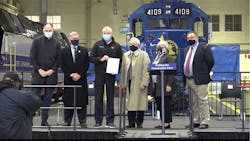NJ Transit reaches PTC implementation finish line
With days to spare, New Jersey Transit (NJ Transit) has attained certification of its Positive Train Control (PTC) system by the Federal Railroad Administration (FRA) and will meet the Dec. 31, 2020, deadline to have the safety overlay system implemented.
FRA began designating which railroads were “at risk” of being in noncompliance of meeting the end of year deadline in its quarterly reports of PTC progress. Eight railroads were on the first “at risk” list and NJ Transit eventually became the only railroad to remain with the designation during the most recent quarterly report. However, with certification of its system from the FRA, NJ Transit has cleared the final hurdle to be in compliance with the deadline.
“As FRA Administrator, one of my greatest privileges has been to oversee—and stand alongside—NJ Transit as it fully implemented FRA-certified and interoperable PTC systems on its network,” said Ronald Batory, Administrator of the Federal Railroad Administration. “I salute and commend the perseverance and commitment at all levels of NJ TRANSIT’s team to meeting this important deadline.”
New Jersey Gov. Phil Murphy said many had assumed NJ Transit would miss the final deadline to implement PTC before using a quote from baseball great Casey Stengel: They said it couldn't be done, but sometimes it doesn't work out that way.
“Our commitment to meeting this deadline and ensuring the safety of every rider along NJ Transit’s rail network is simply an extension of our overall commitment to delivering the world-class transportation experience that NJ Transit customers deserve,” said Gov. Murphy. “As our post-COVID future takes shape in the months ahead, hundreds of thousands of New Jerseyans will again turn to our rail system for their commutes and NJ Transit will be ready to get them to their destinations more safely than ever.”
The core of why PTC implementation was mandated is to enhance safety. NJ Transit President and CEO Kevin Corbett offered a personal reminder that achieving PTC implementation was more that meeting a deadline. A classmate of Corbett’s son at the United States Naval Academy, Justin Zemser, was killed when Amtrak 188 derailed outside of Philadelphia in May 2015 in an accident that the National Transportation Safety Board said could have been prevented by PTC had it been active at the time.
“In many projects I’ve been involved with in my career, I’ve found it’s easy to lose site of the ultimate objective. With PTC it is to save lives,” said Corbett.
Administrator Batory echoed Corbett’s sentiments, noting that while safety ultimately resides with the individuals who work for the railroad, the value of PTC is in its function to reduce risk and offer a new dimension to safety.
Collaboration and determination
To appreciate the achievement, Gov. Murphy and other transportation stakeholders, noted where NJ Transit stood in its progress toward PTC back in 2018, which was at 12 percent complete.
The governor said the team at NJ Transit, along with its contracting partners Parsons and Alstom, performed four years worth of work in 24 months.
Despite the compressed timeframe and around the clock efforts, Terry Fetters, principal project manager at Parsons, gave assurance that no shortcuts were taken to ensure the system was installed and implemented correctly and safely. The system was put through more than 10,000 tests and 35,000 demonstration test runs to make sure it functioned as designed.
NJ Transit’s PTC system required design, development, prototype testing and retrofitting locomotives and cab cars, installation of 326 miles of wayside equipment including radios, transponders and poles, as well as initiating PTC testing and employee training. PTC will complement NJ Transit’s existing cab signaling system and Automatic Train Control (ATC) technology and is interoperable with five other railroads’ PTC systems.
“Achieving this critical milestone was made possible by the combined collaboration, innovation and determination of NJ Transit, Federal Railroad Administration, Parsons and Alstom,” said Chuck Harrington, chairman and CEO for Parsons. “The team worked tirelessly through a global pandemic to ensure the safety of New Jersey’s rail network.”
About the Author

Mischa Wanek-Libman
Group Editorial Director
Mischa Wanek-Libman is director of communications with Transdev North America. She has more than 20 years of experience working in the transportation industry covering construction projects, engineering challenges, transit and rail operations and best practices.
Wanek-Libman has held top editorial positions at freight rail and public transportation business-to-business publications including as editor-in-chief and editorial director of Mass Transit from 2018-2024. She has been recognized for editorial excellence through her individual work, as well as for collaborative content.
She is an active member of the American Public Transportation Association's Marketing and Communications Committee and served 14 years as a Board Observer on the National Railroad Construction and Maintenance Association (NRC) Board of Directors.
She is a graduate of Drake University in Des Moines, Iowa, where she earned a Bachelor of Arts degree in Journalism and Mass Communication.
